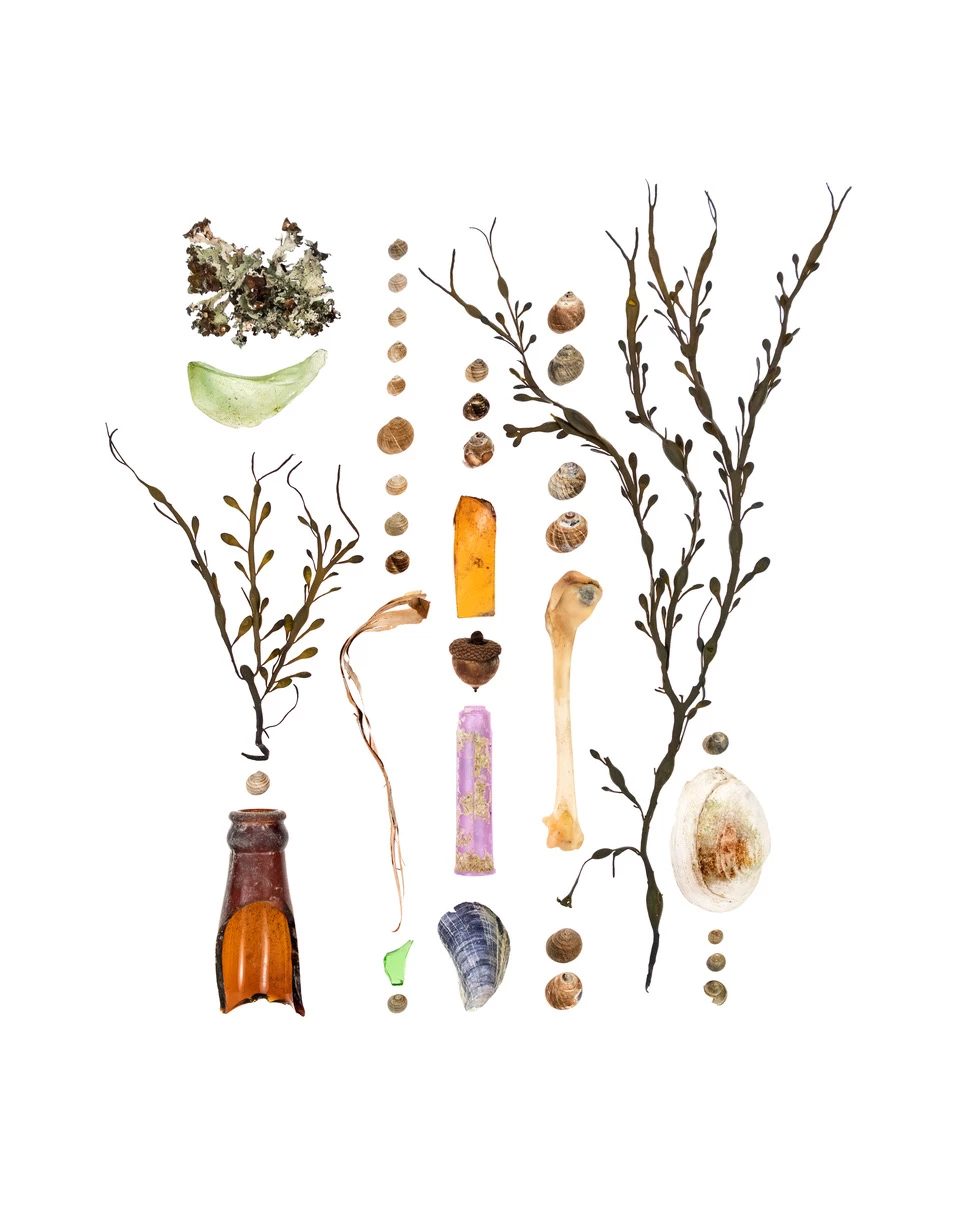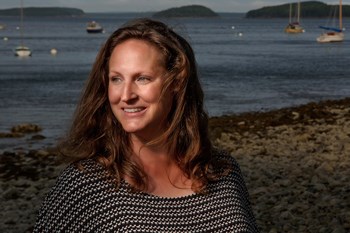Last updated: August 11, 2023
Article
Jennifer Booher
-
Audio description of "Coast Walk 19: Asticou Stream, January 25, 2018"
Audio description of "Coast Walk 19: Asticou Stream, January 25, 2018," an Artist-in-Residence at Acadia in 2015

Courtesy of Jennifer Booher. Used with permission.
Project Description
I live on Mount Desert Island, Maine. I’m fascinated by the life of the shoreline, and curious about everything I see, from the bedrock to the birds – from "what made the hole in this shell" to "what are the old wooden posts just offshore?" Over the years of exploring and documenting the island through digital photography, I developed a stylized form of still life using the metaphor of a scientific transect and plotted points.
The ways humans use the shore, for industry and for pleasure, intertwined with the non-human ecosystems, and the migration of trash all create layers of use on the shore. My walks become a transect of these layers, and the items I pick up are points of intersection between myself and the life of the shore – between the fisherman who cut this piece of rope and the bird who dropped this feather and the winds and gyres that left them in my path. The still life photos plot those intersections, searching for a visual synthesis of all the forces and interconnected usages of the shore. The title of each photo is the location and the date on which I found those objects. The photos are firmly grounded in science as a way of understanding the world, but communicate information and experiences in non-literal and poetic ways.
Those explorations evolved into my current project, the Coast Walk, which is a methodical, long-term exploration of Mount Desert Island’s shoreline. I am circumambulating the island, walking the entire shoreline, interviewing biologists and historians and other stakeholders as I go. I write a photo-essay blog and compose still life photos as two ways of communicating the experience. The process of gathering information is central to the work, as is my own physical presence on the shore.The journey is challenging, climbing over cliffs and seaweed-covered boulders. In the winter, the wind chill is well below zero and the rocks are coated with ice, but the more thoroughly I understand a subject, the more effectively I can communicate its essence to others. I am not trying to draw any conclusions or pass judgment in this work. I allow the gathering process to dominate and am using the still lives to clarify and understand my observations, searching for a way to represent multiple levels of being (cycles of animal lives, plant growth, geologic changes, human occupation, weather and climate) without being diagrammatic.

Jennifer Booher is an artist and photographer living in Bar Harbor, Maine. She received a BA in Art History and Asian Studies at Vassar College in 1989, and a master's degree in Landscape Architecture and Historic Preservation at the University of Virginia in 1997.
- Duration:
- 2 minutes, 20 seconds
Jenn Booher is in the midst of a multi-year, multimedia project to chronicle every step of her "Coast Walk," a quest to experience the entire coastline of Mount Desert Island, including vast portions of Acadia National Park. By summer 2018, she estimated she had covered about 20 miles of what will be a 120-mile journey. During her treks, she photographs wildlife, plant life, geology. And she also gathers (temporarily) trash, seaweed, shells, and found objects to photograph back in her studio. "Although I don't pick up pebbles in the park, ever," she laughs. "I put it all back. The garbage goes in the garbage. Everything else goes back on the shore." Booher contacted the park early in the project to seek advice and sort out formal permissions. The park's support eventually culminated with her appointment as an artist-in-residence, which she says comes in handy sometimes as she negotiates access to private property around the island. "It will take me 10 different landowners to get a mile in some areas. So it's such a relief, it's just like this serious relief to hit the park, and be like, okay, this is public. I can just go there whenever I want. No permission needed. No caretakers. Off I go. The public access that the park provides is just an amazing resource." (Video by Emma Forthofer, Friends of Acadia, NPS)
